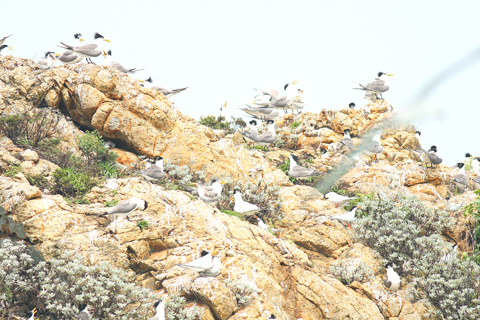The Lienchiang County Government yesterday launched an attempt to save a group of Chinese Crested Terns — a critically endangered species — found roosting on one of the islets in the Matsu Islands.
Ko Mu-shun (柯木順), director of the Construction Bureau under the county government, which has jurisdiction over the Matsu Islands, said the decision was reached after consultation with the Council of Agriculture.
The team, consisting of bird experts and county government officials, landed on an islet where an international bird-watching group sighted a small colony of Chinese Crested Terns last week. The team will examine the situation and decide whether to ask the Wild Bird Society of Taipei to send experts for a rescue mission, Ko said.

PHOTO COURTESY OF THE ASSOCIATION OF SUSTAINABLE ECOLOGICAL ENGI
Last week, Simon Liao (廖世卿), vice president of the Taiwan International Birding Association, and 10 other executives of bird-watching associations from the US, Canada, the UK, Australia and the Netherlands, saw 16 Chinese Crested Terns — the largest number of the rare birds ever recorded.
They said one of the birds had a section of plastic pipe around the bottom of its beak, and that if the object was not removed, the bird could die of starvation within a few days.
Pictures of the bird were carried in local media on Monday.
The Chinese Crested Tern, also known as Thalasseus bernsteini, is one of the world’s rarest birds, with the entire population reported to be fewer than 50 birds.
For most of the 20th century, the species was thought to be extinct, with confirmed sightings in the wild ceasing in 1937.
However, in 2000 a filmmaker discovered a small number of the birds in the Matsu Islands, with the number growing steadily in the past years.
During the latest sighting, bird-watchers said they saw three young birds at the colony, which they saw as evidence that the rare birds are breeding in the Matsu Islands.

Chinese Nationalist Party (KMT) Chairman Eric Chu (朱立倫), spokeswoman Yang Chih-yu (楊智伃) and Legislator Hsieh Lung-chieh (謝龍介) would be summoned by police for questioning for leading an illegal assembly on Thursday evening last week, Minister of the Interior Liu Shyh-fang (劉世芳) said today. The three KMT officials led an assembly outside the Taipei City Prosecutors’ Office, a restricted area where public assembly is not allowed, protesting the questioning of several KMT staff and searches of KMT headquarters and offices in a recall petition forgery case. Chu, Yang and Hsieh are all suspected of contravening the Assembly and Parade Act (集會遊行法) by holding

PRAISE: Japanese visitor Takashi Kubota said the Taiwanese temple architecture images showcased in the AI Art Gallery were the most impressive displays he saw Taiwan does not have an official pavilion at the World Expo in Osaka, Japan, because of its diplomatic predicament, but the government-backed Tech World pavilion is drawing interest with its unique recreations of works by Taiwanese artists. The pavilion features an artificial intelligence (AI)-based art gallery showcasing works of famous Taiwanese artists from the Japanese colonial period using innovative technologies. Among its main simulated displays are Eastern gouache paintings by Chen Chin (陳進), Lin Yu-shan (林玉山) and Kuo Hsueh-hu (郭雪湖), who were the three young Taiwanese painters selected for the East Asian Painting exhibition in 1927. Gouache is a water-based

Taiwan would welcome the return of Honduras as a diplomatic ally if its next president decides to make such a move, Minister of Foreign Affairs Lin Chia-lung (林佳龍) said yesterday. “Of course, we would welcome Honduras if they want to restore diplomatic ties with Taiwan after their elections,” Lin said at a meeting of the legislature’s Foreign Affairs and National Defense Committee, when asked to comment on statements made by two of the three Honduran presidential candidates during the presidential campaign in the Central American country. Taiwan is paying close attention to the region as a whole in the wake of a

OFF-TARGET: More than 30,000 participants were expected to take part in the Games next month, but only 6,550 foreign and 19,400 Taiwanese athletes have registered Taipei city councilors yesterday blasted the organizers of next month’s World Masters Games over sudden timetable and venue changes, which they said have caused thousands of participants to back out of the international sporting event, among other organizational issues. They also cited visa delays and political interference by China as reasons many foreign athletes are requesting refunds for the event, to be held from May 17 to 30. Jointly organized by the Taipei and New Taipei City governments, the games have been rocked by numerous controversies since preparations began in 2020. Taipei City Councilor Lin Yen-feng (林延鳳) said yesterday that new measures by